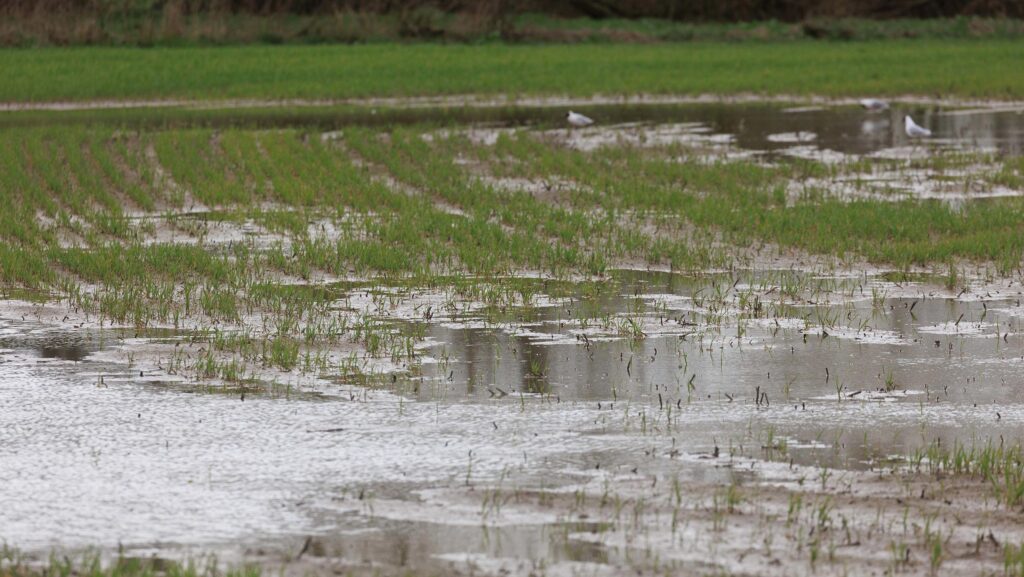Farmers lost £1bn to extreme weather in 2024, Defra says
 © Tim Scrivener
© Tim Scrivener UK farmers faced a loss of more than £1bn in arable crop income in 2024, primarily due to severe weather including an exceptionally wet winter, according to new government data.
Defra released the UK’s Total Income from Farming (Tiff) figures for 2024 on Thursday (5 June).
The data reveals significant declines in wheat, barley, and oilseed rape output and value, driven by prolonged wet conditions during crucial planting periods, saturated soils, and poor harvest yields.
See also: Fears grow over cuts to nature-friendly farming budget
Harvest wheat production dropped by 20.3% to 11.1m tonnes – the lowest since 2020 – due to an 11% reduction in planted area and a 10.4% fall in yields.
Wet conditions in the winter and spring limited both the quantity and quality of wheat crops.
Income from wheat alone fell sharply by £796m (27%) to £2.16bn. Barley income decreased by £190m (14.1%) to £1.16bn, while oilseed rape dropped £149m (30.8%) to £335m.
Wheat prices in 2024 also declined from the elevated levels seen in 2022 and 2023, influenced by the easing of supply disruptions from the Ukraine-Russia conflict.
The average price of UK breadmaking wheat was £238.64/t, down 9.6% compared to 2023.
Food security ‘at risk’
The Energy and Climate Intelligence Unit (ECIU) said Defra’s data validates its earlier warnings that worsening extreme weather events are eroding farming incomes and threatening long-term food security.
“Farmers are now counting the cost of climate change,” said Tom Lancaster, a land and food analyst at the ECIU.
“With another challenging harvest likely this summer due to heat and drought, farming’s financial resilience is being pushed to the limit.”
Livestock sector gains
Despite the steep arable losses, total farming income actually increased by 26% to £7.7bn in 2024, up from £6.1bn the previous year, driven by strong returns from milk and beef and a £1.2bn drop in input costs, largely from cheaper fertiliser.
The livestock sector’s output increased by more than £1bn, with notable gains in milk, beef, and egg production.
Egg income surged 35%, supported by higher prices and consumer demand for free-range products.
Milk prices rose 4.4% to 41p/litre, driving an increase in production volume late in the year.
Beef income also grew by £352m (9.3%) to £4.1bn, helped by high prices for prime cattle and a 3.8% rise in home-fed beef production.
Spending Review ‘pivotal’
However, arable farmers remain vulnerable to climate volatility, raising concerns about the future of UK staple crops and funding for Environmental Land Management schemes aimed at boosting resilience.
These Tiff figures come just days before the Labour government’s Spending Review on 11 June, amid reports of possible cuts in future funding for agri-environment schemes.
Mr Lancaster stressed the importance of these schemes, saying they are “pivotal to maintaining productive land, protecting nature, and reducing risks linked to worsening climate impacts”.
Defra view
The UK government says it is investing £5bn into sustainable farming in England over two years and it remains committed to putting more money back into farmers’ pockets, as part of its Plan for Change.
Defra farming minister Daniel Zeichner said: “Farming incomes are on the rise – credit to the hard work of our farmers keeping the country fed and protecting the long-term food security our country needs.”
NFU warning
But farming organisations have repeatedly warned the Labour government that its plans to impose inheritance tax on the industry from April 2026, dubbed the “family farm tax” by the NFU, will threaten the viability of family-run farms, discourage succession, and risk forcing the sale of agricultural land.
NFU president Tom Bradshaw welcomed the rise in farm profitability but warned it masks major challenges, including recent volatility, high input costs, and sector-specific struggles – especially for arable farmers hit by falling prices and extreme weather.
He called for stronger, long-term government support and urged ministers to prioritise food security in the upcoming spending review.
“Farmers are resilient and adaptable, but they cannot shoulder all the risk on their own,” Mr Bradshaw said.
“This is a clear signal that government must step up and put food security at the heart of its priorities.”
